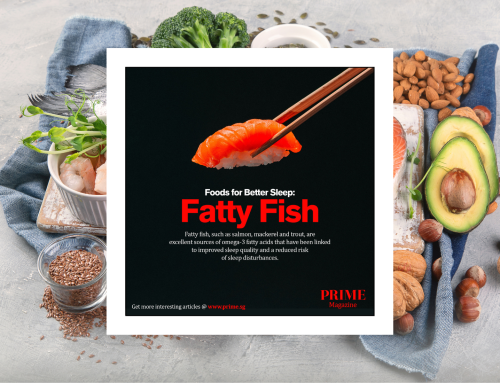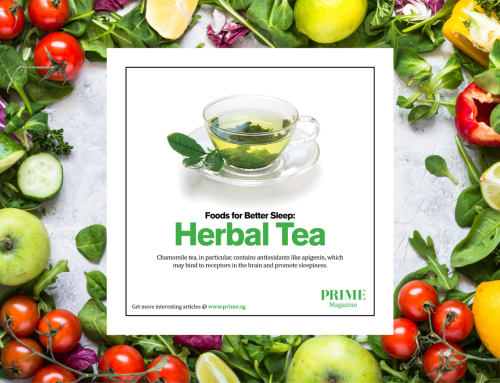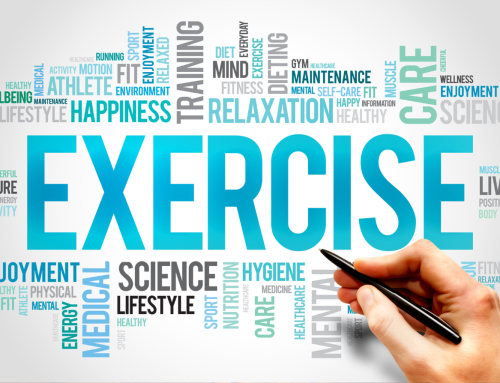The Recipe to Healthy Ageing?
As we age, our nutritional requirements change – some reduced, while some needed in higher amounts in our later life. Together with the psychological and physiological changes brought forth with ageing, getting a balanced diet seems tricky. Read on to learn the recipe to healthy ageing!
Today, 30% of the ageing population is at risk of being malnourished. Though largely unaware by the public. The elderly are vulnerable to malnutrition: many of the diseases suffered by the elderly are the result of dietary factors.
Issues that can affect seniors’ nutritional intake or getting a balanced diet
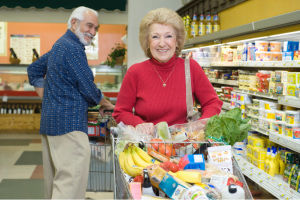
Physiological changes associated with ageing process occur and can affect nutritional intake. Changes in sensitivity to taste, chewing and swallowing ability, muscle wasting, reduce in thirst sensitivity and early satiety are a few changes that can occur. Added on to these are financial and phychosocial issues that further contribute to suboptimal food intake, which reduces their nutritional intake.
Approximately a quarter of seniors have reduced ability to detect one or more of the four basic tastes (sweet, sour, salty and bitter) (WHO 2002). This factor can greatly reduce the enjoyment of food.
Dentition
Some seniors may have incomplete dentition which can affect their ability to chew food, especially regular texture food items that require chewing. Feeling tired from chewing food or chewing with loose dentures may reduce their food intake too. Some seniors might end up taking more of starches rather than meat dishes, as meat dishes are harder in texture. This can significantly reduce their total protein intake.
Appetite
Seniors generally reduce their total food intake as they age. This could possibly be due to psychosocial reasons such as: feeling lonely, depressed, disease burden or social issues. At their age, seniors might be facing empty nest syndrome, death of a spouse, sickness or functional decline that may contribute to psychological issues. This can greatly reduce their appetite and desire to prepare food and eat. Seniors may have lesser sensitivity towards tastes. This could contribute to reduction in food intake too. As they age, seniors might have more chronic diseases (e.g. diabetes, hypertension, heart diseases, etc.) and medications to manage these conditions, which may alter the sense of taste and ultimately affect food intake.
Access to food
Seniors may possibly face issues in gaining access to food. Some seniors live or stay during the day. They might not have access to a proper meal; unable to go out to get food or unable to cook for themselves. Functional decline may affect senior’s abilituy to prepare food. Lack of income and limited financial ability may affect their access to food or limit their choices.
Change in cognitive function
Cognitive function, dementia and Alzheimer’s disease may have impact on food intake. Nutritional intake is affected by refusal to eat, erratic eating habits and safety concerns when they are discouraged from cooking.
Ingredients
Most prevalent nutrients commonly deficient in seniors diet and consequences
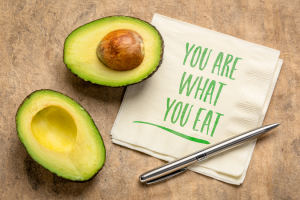
As seniors decrease their food intake, their total energy and micronutrients intake are reduced. Total energy requirement for seniors decreases as they reduce their physical activity. However, the requirement for most micronutrients remains the same. It is therefore important for seniors to consume nutrient-dense food to ensure micronutrients intake.
Protein
Seniors are prone to muscle wasting and sarcopenia (loss of muscle and strength). Suboptimal food intake causes reduced in total protein intake too. Seniors who are sick require higher protein for healing. Food rich in pritein are fish, poultry, red meats, tofu, eggs, beans and legumes, milk and dairy products.
Calcium
Calcium is essential for bone health. Food rich in calcium are: milk, dairy products, tofu, green leafy vegetables (e.g. kailan, spinach and chai sim), broccoli and almonds. Seniors are encouraged to take 2-3 servings of high-calcium milk or dairy products a day. Fortified soymilk, tofu, and green leafy vegetables can be good sources for calcium for seniors who are lactose intolerant.
Vitamin B21
Seniors cannot absorb vitamin B12 as efficient as the young people. Vitamin B12 is important for maintaining health of nerves and red blood cells. Food rich in Vitamin B12 are shellfish, beef and chicken liver, salmon, mackerel, milk and eggs. Doctors can advise if Vitamin B12 supplement is required.
Vitamin D
Vitamin D helps the body to absorb calcium to maintain bone health. Older adults with deficiency in Vitamin D has increased risk of falling. Food rich in Vitamin D are salmon, tuna and eggs. Seniors would need to get outdoor to have some sunlight to help the skin to produce Vitamin D. However, seniors might need to get Vitamin D supplements as the body might be inefficient in producing adequate amount of Vitamin D.
Folate
Inadequate intake of folate may contribute to anemia. Food rich in folate are: lentils; beans; nuts; dark green leafy vegetables such as broccoli, spinach; ladies finger and asparagus; papaya; oranges; grapefruits; strawberries; avocado; corns and carrots.
Iron
Iron absorption may be reduced among seniors. Inadequate iron may cause anemia among seniors. Food rich in ion are meats (especially red meat), eggs, beans, dark green leafy vegetables and peas.
Water
Dehydration is one of the cause of admission to hospitals. Adequate fluids intake helps to prevent constipation which is a common issue among seniors. However, most seniors do not drink adequate amount of water as their sensation for thirst reduce. Water inake among seniors decrease as they age, which can be observed as the total intake of beverages and water reduced. Water requirement is highly variable among seniors, as conditions such as congestive heart problem and kidney disease may require fluid restriction. Generally, seniors are encouraged to consume at least 6 glasses of water a day, as well as other beverages such as soup, milk, juices coffee or tea.
Directions
Healthy eating guides for seniors
Use My Healthy Plate as general guide to healthy eating
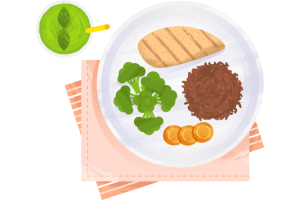
Seniors should focus on getting adequate amount of protein (from meat and alternative groups). Caregivers may consider to modify its texture to encourage intake. Food that has been minced or opureed may be easier for seniors to chew. This can encourage intake and prevent muscle wasting. Seniors should aim to consume 2 servings of fruits and 2 servings of vegetables per day. Caregivers should ensure adequate water intake as water is required to soften the stool to prevent constipation from fiber intake. Caregivers may also offer beverages such as milk, coffee, tea, juices and water a few times through the day. Starches like rice, noodles, bread, chapatti, thosai, oatmeal and starchy vegetablkes such as potato, sweety potato and yam are good choices to ensure adequate energy intake.
Nutrient-packed food or meals
Nutrient dense meals can benefit seniors by increasing their total nutritional intake. Seniors can increase their intake by fortifying meals with food rich in protein and energy. This can be as simple as adding an egg or smashed tofu to porridge, sprinkling some oil to dishes or by adding ground nut powder to drinks.
Using natural flavours
Spices, herbs or ingredients such as onion, garlic, ginger, honey, curry leaves, cinnamon and lemon are good ingredients to enhance flavour in food as seniors have lower sensitivity to taste.
Healthy cooking methods
Seniors can opt for healthy cooking methods such as braising, stewing, stir-frying, steaming, baking or grilling. Caregivers can be creative in making meals for seniors to encourage oral intake.
Healthy fats
Healthy fats such as monosaturated and polysaturated fats are healthy options for heart health. Seniors can acquire healthy fats from cooking oil such as olive oil. Eating nuts, fish (especially deep sea fish) and avocado. Somecaregivers misunderstand and deem fats as unhealthy, but seniors too need fats as art of a healthy, balanced diet.
Eating is essential as part of life’s pleasures. Healthy and delicious meals and eating with others can improve seniors’ enjoyment during meals.

Koh Pei Ling
Senior Dietician
Nutrition and Dietics Department
Khoo Teck Puat Hospital








